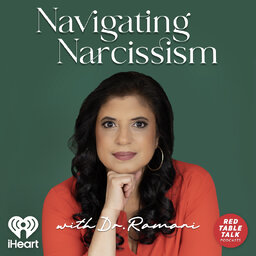Ask Dr. Ramani: How To Go "No Contact" with a Narcissist
Dr. Ramani answers your deep questions about the most difficult - but most effective - way to heal from narcissistic abuse: going no contact.
Watch and Subscribe to our YouTube Channel @NavigatingNarcissismPod
Follow me on social:
- Instagram - @doctorramani
- Pod Instagram - @navigatingnarcissismpod
- Facebook - @doctorramani
- Twitter - @DoctorRamani
- YouTube: Dr. Ramani’s YT - DoctorRamani
I want to hear from you, too. Have a toxic topic you want me to explore? Email me at askdrramani@redtabletalk.com. I just might answer your questions on air.
This podcast should not be used as a substitute for medical or mental health advice. Individuals are advised to seek independent medical advice, counseling, and/or therapy from a healthcare professional with respect to any medical condition, mental health issue, or health inquiry, including matters discussed on this podcast.
EXECUTIVE PRODUCERS Jada Pinkett Smith, Ellen Rakieten, Dr. Ramani Durvasula, Meghan Hoffman VP PRODUCTION OPERATIONS Martha Chaput CREATIVE DIRECTOR Jason Nguyen LINE PRODUCER Lee Pearce PRODUCER Matthew Jones, Aidan Tanner ASSOCIATE PRODUCER Mara De La Rosa ASSOCIATE CREATIVE PRODUCER Keenon Rush HAIR AND MAKEUP ARTIST Samatha Pack AUDIO ENGINEER Calvin Bailiff EXEC ASST Rachel Miller PRODUCTION OPS ASST Jesse Clayton EDITOR Eugene Gordon POST MEDIA MANAGER Luis E. Ackerman POST PROD ASST Moe Alvarez AUDIO EDITORS & MIXERS Matt Wellentin, Geneva Wellentin, VP, HEAD OF PARTNER STRATEGY Jae Trevits Digital MARKETING DIRECTOR Sophia Hunter VP, POST PRODUCTION Jonathan Goldberg SVP, HEAD OF CONTENT Lukas Kaiser HEAD OF CURRENT Christie Dishner VP, PRODUCTION OPERATIONS Jacob Moncrief EXECUTIVE IN CHARGE OF PRODUCTION Dawn Manning
In 1 playlist(s)
Navigating Narcissism with Dr. Ramani
We all have to deal with narcissists. Now, it’s time to heal from them. In this groundbreaking serie…Social links
Follow podcast
Recent clips

Evan Rachel Wood on Surviving Her Abusive Relationship with Marilyn Manson
1:41:41

My Famous Parents are Narcissists with Juliet Landau
1:06:20

Extreme Post-Separation Abuse with Jo Fonda
1:03:46
 Navigating Narcissism with Dr. Ramani
Navigating Narcissism with Dr. Ramani